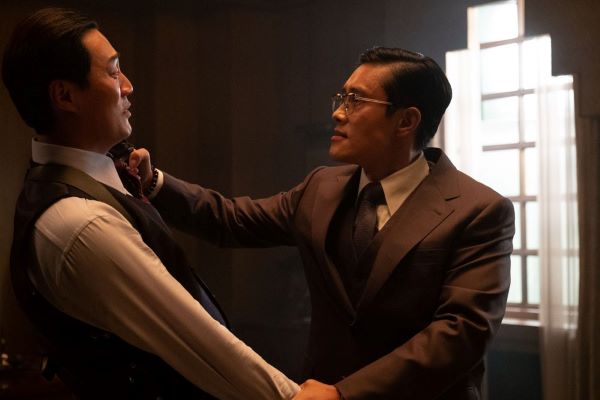Woo Min-ho’s South Korean Academy Award contender, The Man Standing Next, details the 40 day countdown to President Park Chung-hee’s assassination in 1979. Based on a novel of the same name, Park’s second-in-command, Kim Gyu-pyeong (Lee Byung-hun) is fictionalised slightly to create a noir narrative while simultaneously leading us through this period of oppression. Recent cinema has seen caricatured versions of cyclical dictatorships before (Armando Iannucci’s 2017 satire The Death of Stalin springs to mind), but Woo’s sharp characterisation is used to maintain serious moral ambiguity.
A respectable slice of The Man Standing Next is a sequence of confrontations and restrained interactions. Retelling historical events, Woo’s direction adds espionage-like elements to what could have been mundane party politics. The film achieves an implicit panicked scramble of round the clock betrayal, repeated incidents of the president telling his confidants to, ‘Do as you please,’ as he tactically removes himself from anything incriminating – a gambit that certainly seems to have worked well for him throughout an 18-year reign. One particular scene at the Lincoln Memorial in Washington packs a punch, as ex-director of the Korean CIA (Kwak Do-won), and current director Kim stare at Lincoln’s statue, they don’t see America’s saviour, but a symbol that no one is safe. The Man Standing Next has chilling moments of relevance, as these two characters scheme near the Capitol, giving the film an untapped clairvoyance of the current times.
The Man Standing Next takes its time to discuss, strategise, form alliances. All of this back and forth leaves little room for surprises, but this is where the film goes beyond a classic tale of men in fitted suits plotting against one another (this is no Kingsman, despite a rival body-in-meat-grinder scene). Ultimately it is driven by what is not said, boiling down to the relationship between a ruler and his inferior. Lee’s performance is the stand out act, as Kim’s loyalty is tested to a breaking point, emotions always just bubbling under the surface. Lee’s facial expressions quietly tell another story – when Kim eavesdrops on the man he once put on a pedestal, his face wordlessly communicates a shift in his plans as stoicism turns to devastation. Woo wisely keeps mum over the true motivations of Park’s assassination, given the real-life Kim’s coup is still shrouded in mystery: did he feel betrayed by their joint ideologies or was it a deeper betrayal of camaraderie? A political assassination previously untold on this scale, it seems appropriate that as South Korean cinema continues to soar that audiences are educated on this moment of threat to Korea’s democracy. The Man Standing Next can safely be woven in amongst the best of Korea’s archive.
To round off the Glasgow Film Festival’s Country Focus segment, The Man Standing Next is a subtle, interpretative tour de force with an incredibly satisfying upshot.
Screening as part of the Glasgow Film Festival 2021 from Sun 7 Mar 2021
